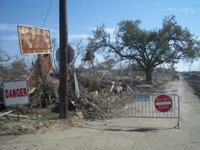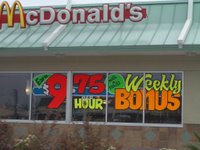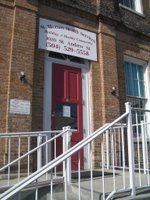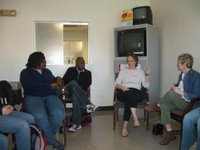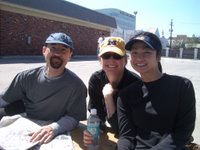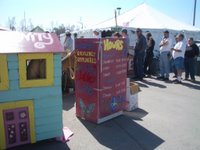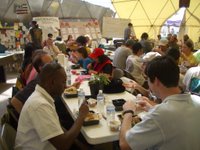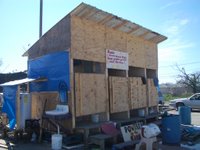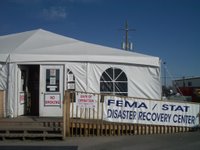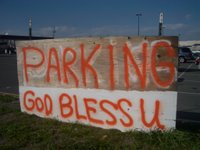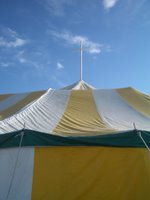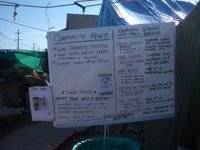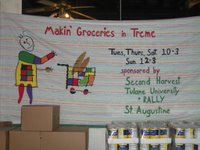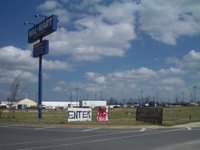Day 4: Tobacco-Free Living 2 - Today was zipped through the rest of Magazine Street, as well as the Riverbend area of St. Charles Avenue and South Carrollton Avenue. We notified the
LPHI and received some additional streets that we may want to hit up. But in general, the team is finding it difficult to stay motivated with this project since it has nothing to do with hurricane efforts. In fact, the team has found it quite frustrating, especially when we explain that we're from
UMSPH down for recovery efforts, describe our project, and get blank stares and "What does
that have to do with anything?" We can read the
group blog too and see other groups driving over buckled roads and wearing spacesuits, doing things directly related to storm recovery efforts.
Our project is a continuation of a pre-Katrina initiative. Of course, smoking policy is an important issue, but under these circumstances, it's hard to believe that there aren't more pressing issues that we could be addressing during our week here. How has Katrina impacted your business? Have you seen changes in the smoking habits of your clientele? Would the storm cause you to change your establishment's smoking policy?
In general, we have committed to this project for PHAST, but we must use initiative to get something greater, more personally fulfilling out of this week. And I think we're doing that. We're talking to locals about their experiences, reading the local news, exploring the areas most affected by levee breaches and flooding, and visiting the disaster relief centers to see what's being done on the ground in the community.
Stories - I believe it was Dr. Button who emphasized that we really need to listen to the stories
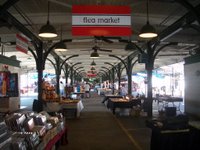
of the people. To sit down and really listen. I have already seen the rewards of that two days ago in meeting Dilma and my former professor. Today was stopped in the French Market for some souvenir shopping (about 1/4 the size and no where near the usual crowds), and I got to talking with an older woman setting up shop with her Mardi Gras and NOLA trinkets. I was stocking up on items for my summer in Beijing souvenir baggies. We were talking about all the Cajun recipes on the pot holders when I casually slipped in a question about how she has fared since the storm. Every local I've met loves to talk about the storm, and every local has interesting stories.
Her sister in Plaquemines Parish got water up to the ceiling of the first floor, and it was two months before they could return. She could have saved and washed many items, but decided to throw out everything after finding nine black snakes in the house and a wild pig in the upstairs bed! One of the neighbors decided to ride out the storm because they'd rode out Betsy (i.e. Hurricanes Betsy and Camille, the big ones), but they didn't make it. Their children found them in the house after they were able to return. Imagine finding your parents like that. It makes me shiver. Worse yet, I've heard this story more than once. Rohan also met a very interesting man who rode out the storm and had a very interesting perspective on the entire post-Katrina situation. We hear all these conspiracy theories, but when you start hearing the same stories from disparate sources, you really start to reconsider your initial doubts.
"Someone has to do it" - This morning at breakfast I was flipping through the Times Picayune, full of post-Mardi Gras reports. The picture and caption indicated that this year's Mardi Gras was a success, judging by the tons of trash generated. We joked that perhaps our Glad Bag efforts might have messed up the count. On page 4 were small blocks of information, and one was about voting in the upcoming New Orleans mayoral election. It noted that anyone needing to vote absentee should email/mail
so and so (see "elections"). The problem is this - anyone who needs an absentee ballot has difficult access to this information. Where are these displaced people (everywhere), and who is informing them of the procedures,
the changing ballots, their rights? And obtaining an absentee ballot is a complicated procedure; I was never able to obtain one myself while I was an undergrad in Houston because the process was so convoluted. And so, considering the crazy situation now, and the decision to follow the old guidelines, what displaced people will actually be able to obtain absentee ballots, and who
really will get to vote in this election? It's not difficult then to jump to questions of who are making these decisions, and whose interests are they really looking out for? Obviously, those most affected by the difficulty of procuring absentee ballots are those who cannot move back yet...the poor and minority.
But what frustrated me most was this - when I asked these questions at the table, incensed by the obvious injustice, the general sentiment was just of agreement, "Someone has to do it." Yes, someone does have to do it, but WHO? In most cases, I am a political inactivist, sorry to say. There always seemed to be enough loud mouths to cover any one side of an issue, but his time around, WHO's going to do it? We talk about community-based health care, but what is it without the community, when we don't know where that community is? I hear that FEMA won't release the names of the displaced, so it's difficult to locate them.
WE have seen this week the level of destruction and inactivity that still plagues this city. And without new ways of thinking and infusions of new ideas and structures, I fear that what I've described will come to pass, and that this city will be dominated by...classist, racist, sexist pigs. Wow, that's a lot of sentiment I don't usually wear on my sleeve, but it is something that really bothers me about the subconscious of this city. Finally, my teammates are understanding the severity of the problems here, which comforts me from Tuesday when I lamented and carried the weight alone. I feel that we can do something. We need to organize...decide what message we want to bring back to Michigan, what alliances we can build, and how to spread the stories and to bring the people back to New Orleans.
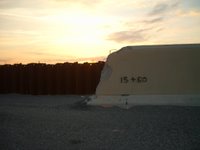 The Power of Water
The Power of Water - We visited the levee breach at the 17th Street Canal, guided by my U.S. News & World Report article on rebuilding the levees. I've been the week's navigator, and in general I've done a good job, but I totally led the group in the opposite direction, coming to the conclusion that some bumpy broken pavement at the levee's edge was it. Luckily, Shawn's map-reading skills kicked in and led us to the real site. This breach is located just across the parish border between Jefferson and Orleans.

It was incredible. The entire breach was blocked off by a chain-linked fence, but the break in the cement wall was clean and obvious. The 150-200 meter hole was plugged up by tall metal pillars. The force of the wall of water that broke the barrier

and came gushing in was obvious when we looked at the homes directly behind the wall. They were completely smashed and had been lifted from their foundations completely such that houses actually crashed into one another. Roofs caved in, eight-foot-high water lines, house frames stood leaning or completely destroyed, living rooms and home lives laid bare. The scene was spellbinding, and knowing that we were standing on a site that witnessed a force that would have killed us instantly on impact, even before we could drown, was almost overwhelming. And after six months, no one has yet returned to their homes, to pick up their lives. Now that's scary.
